Authorities in Madagascar successfully blocked an attempt to ship illegally logged rosewood from the port of Vohemar over the weekend, according to local reports. The incident—while isolated—suggests citizens, the Waters and Forests Administration, local media, and shipping companies are having an impact on slowing the rosewood trade that has devastated Madagascar’s rainforest parks, wildlife, ecotourism industry, and rural communities.
News of the pending shipment broke on November 2 when a local newspaper, La Verité, reported that preparations were being made to ship up to 100 containers of rosewood—with a retail value of $20 million—despite a nation-wide ban on rosewood exports. The shipment was allegedly being organized by Vernier “Veve” Mathon, a rosewood trader who claimed to be acting under an exemption granted by Andry Rajoelina, Madagascar’s president under the “transitional government” that seized power during a coup in March 2009. Mathon said the customs authority of Vohemar had signed off on a shipment abroad the Kiara, a ship owned by the French company CMA-CGM.
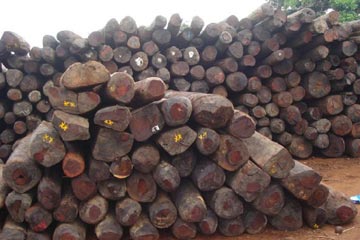 Rosewood logs. 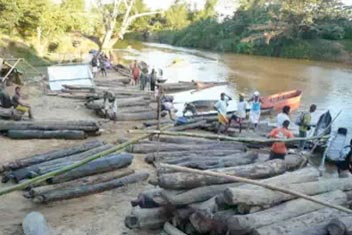 Precious hardwood logs are tied together with lianas and floated down rivers on rafts made from lighter species as trees. 5-6 lighter logs are needed to float each rosewood log, exacerbating the impact of rosewood extraction. |
But as news of the impending shipment spread, officers from the Waters and Forests Administration stepped up efforts to monitor the port, according to a local source.
“It was the officers of the Waters and Forests Administration who really prevented the traffickers [from succeeding],” said the source. “They followed each empty container in great detail with serial numbers in the entire area of Vohemar and double-checked what was in it. This way, the traffickers couldn’t fill the containers [with rosewood] out of sight of the officials.”
At the same time, the shipping company CMA-CGM also increased its vigilance.
“CMA-CGM has been very careful with its shipment and checked all the forms,” the source said, noting that the September arrest of two Maersk representatives in Toamasina (Tamatave) for allegedly allowed rosewood-filled containers to leave the port aboard one of their ships, may have had an impact.
“It is very likely that the misadventure of the two Maersk representatives in Toamasina makes shipping companies very sensitive, now.”
There were also indications of grassroots opposition to the shipment, include local discussions around organizing an “occupation” of the port in order to bear witness to any transgressions. Rosewood trafficking has turned into a hot political issue in recent months in Madagascar, with members of the transition authority being linked to illicit transactions. Last month an undercover investigation by the Environmental Investigation Agency captured Chinese rosewood dealers on video claiming to they make wood deals directly with President Rajoelina.
But rosewood trafficking isn’t new to Madagascar: research published in the June issue of the journal Madagascar Conservation & Development found that rosewood logging has followed a cyclical pattern since at least the 1990s. Timber is harvested on a continual basis and stockpiled until a natural disaster, like a cyclone, or political strife creates an opportunity for shipment. Logging syndicates make a fortune until opposition from conservation groups and international aid agencies shuts down the trade, at least until the next event.
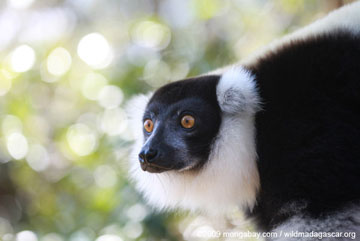 Recent rosewood logging has been associated with a rise in commercial bushmeat poaching of lemurs. Loss of lemurs can have ecological effects in forests. According to Patricia Wright, lemurs appear to be the most important seed dispersers in Madagascar. Worryingly, Wright says that the “tastiest” lemur—as revealed by surveys of more than 2,000 individuals in local villages—is also one of the most important dispersers: the black-and-white-ruffed lemur. 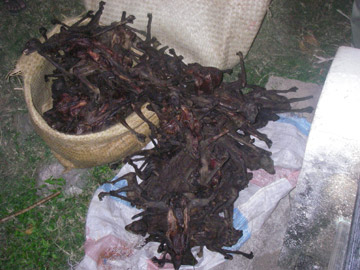 These animals are the crowned lemur, Eulemur coronatus and the golden crowned sifaka, Propithecus tattersalli. Copyright: © Fanamby/photos by Joel Narivony |
“Illegal exploitation continues throughout the entire cycle, as the government only really controls the export process (i.e., from the loading of containers on board a ship in port to its departure). Timber exporters accumulate stocks while waiting for a favorable phase in the cycle,” wrote Randriamalala and Liu, authors of the Madagascar Conservation & Development article.
Most of the benefits from illegal logging accrue to a small group of wealthy individuals. The costs are borne by the rest of Malagasy society, which is increasingly dependent on tourists who come to see the island’s natural attractions, including endemic wildlife like lemurs and impressive landscapes like rainforests and coral reefs. Deforestation can also reduce the availability of clean water and food sources.
“Madagascar’s tourism industry annually brings nearly a half-billion US dollars to tens of thousands of people involved in all aspects of the industry (hotel and restaurant staff, guides, drivers, taxi operators, boat skippers, artisans and more).” Randriamalala and Liu wrote. “By contrast, the illegal high – end timber industry has resulted in a one-time windfall of an estimated $ US 220 million for just twenty-three individuals.”
References
- Randriamalala, H. and Liu, Z. Rosewood of Madagascar: Between democracy and conservation. MADAGASCAR CONSERVATION & DEVELOPMENT. Volume 5|Issue 1, JUNE 2010
Related articles
The $1M bed: why Madagascar’s rainforests are being destroyed
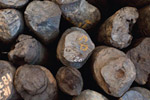
(10/26/2010) Consumer demand for rosewood furniture and musical instruments is driving illegal logging in Madagascar’s national parks, endangering wildlife and undermining local community livelihoods, according to a new report from the Environmental Investigation Agency (EIA) and Global Witness. The report, based on more than a year of investigations, shows that Madagascar’s valuable hardwoods—including ebony, pallisander, and rosewood—are being illegally harvested from rainforest parks and trafficked to Asia, Europe, and the United States. The vast majority of timber however ends up in China, where it is converted into luxury furniture.
The illegal logging cycle in Madagascar
(06/23/2010) The latest issue of the journal Madagascar Conservation & Development provides a comprehensive look into Madagascar’s illegal logging trade, which has generated more than $200 million for a small group of individuals over the past year. The trade, which spikes just prior to national elections and may be a source of funds for ruling politicians, has taken a heavy toll on the lowland rainforests of Madagascar, with targeted species now at risk of extinction.
Madagascar bans rainforest timber exports following global outcry
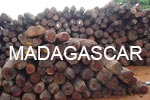
(03/25/2010) Under mounting pressure over illegal logging of its national parks, Madagascar’s transitional government on Wednesday reinstated a ban on rosewood logging and exports. The decree (no. 2010-141), which prohibits all exports of rosewood and precious timber for two to five years, was announced during a council meeting held yesterday at Ambohitsorohitra Palace in Antananarivo, Madagascar’s capital city.
How to end Madagascar’s logging crisis

(02/10/2010) In the aftermath of a military coup last March, Madagascar’s rainforests have been pillaged for precious hardwoods, including rosewood and ebonies. Tens of thousands of hectares have been affected, including some of the island’s most biologically-diverse national parks: Marojejy, Masoala, and Makira. Illegal logging has also spurred the rise of a commercial bushmeat trade. Hunters are now slaughtering rare and gentle lemurs for restaurants.
Satellites being used to track illegal logging, rosewood trafficking in Madagascar

(01/28/2010) Analysts in Europe and the United States are using high resolution satellite imagery to identify and track shipments of timber illegally logged from rainforest parks in Madagascar. The images could be used to help prosecute traders involved in trafficking and put pressure on companies using rosewood from Madagascar.
Coup leaders sell out Madagascar’s forests, people

(01/27/2010) Madagascar is renowned for its biological richness. Located off the eastern coast of southern Africa and slightly larger than California, the island has an eclectic collection of plants and animals, more than 80 percent of which are found nowhere else in the world. But Madagascar’s biological bounty has been under siege for nearly a year in the aftermath of a political crisis which saw its president chased into exile at gunpoint; a collapse in its civil service, including its park management system; and evaporation of donor funds which provide half the government’s annual budget. In the absence of governance, organized gangs ransacked the island’s biological treasures, including precious hardwoods and endangered lemurs from protected rainforests, and frightened away tourists, who provide a critical economic incentive for conservation. Now, as the coup leaders take an increasingly active role in the plunder as a means to finance an upcoming election they hope will legitimize their power grab, the question becomes whether Madagascar’s once highly regarded conservation system can be restored and maintained.